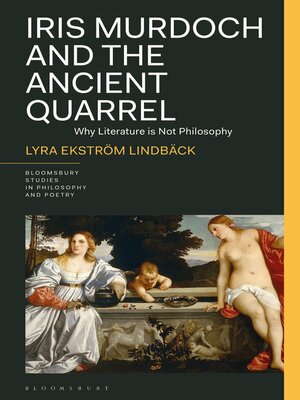Iris Murdoch and the Ancient Quarrel
ebook ∣ Why Literature Is Not Philosophy · Bloomsbury Studies in Philosophy and Poetry
By Lyra Ekström Lindbäck

Sign up to save your library
With an OverDrive account, you can save your favorite libraries for at-a-glance information about availability. Find out more about OverDrive accounts.
Find this title in Libby, the library reading app by OverDrive.



Search for a digital library with this title
Title found at these libraries:
| Library Name | Distance |
|---|---|
| Loading... |
Lyra Ekström Lindbäck revisits the crucial distinction between literature and philosophy in Iris Murdoch's work to make a convincing case for understanding the particularity of literature and her insistence on the separation between the two.
Iris Murdoch and the Ancient Quarrel makes a break with existing scholarship on Murdoch's philosophy and literature that ultimately re-states the philosophical value of literature, alongside literary aspects of philosophy. This book differs by deepening Murdoch's insistence on the differences between the disciplines, providing a consistent and polemical argument for the distinction between literature and philosophy more generally. Engaging thinkers such as Plato, Kant, Hegel, Sartre, Weil, and Cavell, Iris Murdoch and the Ancient Quarrel delves into the aesthetic characteristics that distinguish philosophy and literature. Through a discussion of the illusion of sense, the role of conceptual thinking in literature, the clash between epistemology and fiction, the artifice of tragedy, and the ambiguous morality of artistic inspiration and experience, this study reveals literature as essentially other to philosophy.
Iris Murdoch and the Ancient Quarrel makes a break with existing scholarship on Murdoch's philosophy and literature that ultimately re-states the philosophical value of literature, alongside literary aspects of philosophy. This book differs by deepening Murdoch's insistence on the differences between the disciplines, providing a consistent and polemical argument for the distinction between literature and philosophy more generally. Engaging thinkers such as Plato, Kant, Hegel, Sartre, Weil, and Cavell, Iris Murdoch and the Ancient Quarrel delves into the aesthetic characteristics that distinguish philosophy and literature. Through a discussion of the illusion of sense, the role of conceptual thinking in literature, the clash between epistemology and fiction, the artifice of tragedy, and the ambiguous morality of artistic inspiration and experience, this study reveals literature as essentially other to philosophy.







